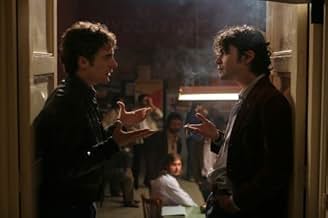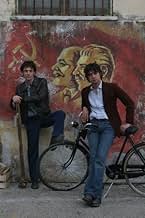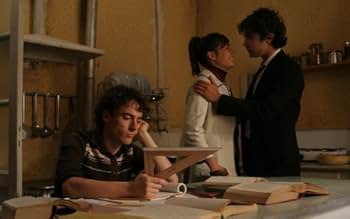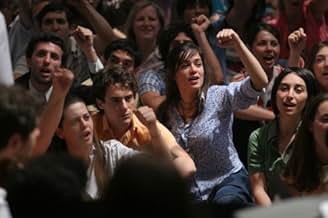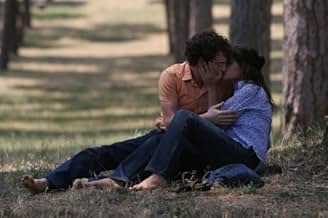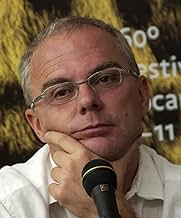VALUTAZIONE IMDb
7,0/10
6868
LA TUA VALUTAZIONE
Due fratelli diventano maggiorenni in una piccola città italiana degli anni '60 e '70.Due fratelli diventano maggiorenni in una piccola città italiana degli anni '60 e '70.Due fratelli diventano maggiorenni in una piccola città italiana degli anni '60 e '70.
- Regia
- Sceneggiatura
- Star
- Premi
- 19 vittorie e 29 candidature totali
Antonino Bruschetta
- Segretario Bombacci
- (as Ninni Bruschetta)
Recensioni in evidenza
There's this much to be said for this movie from the ranks of Italy's new young directors and actors: The quality of the acting was at least one notch above the usual fare, which almost never transcends the clichéd facial expressions and intonations we expect to find in TV dramas and sit-coms. This new generation of actors and directors was raised on US television imports ("telefilms") and Latin-American soaps, and it definitely shows in the uninspired and uninspiring quality of their work. And one gets the impression that 90% of them come from Parioli, a very well-to-do neighborhood of Rome, that would be the rough equivalent of coming from Santa Monica, Lake Forest IL, or Westport Conn—all those perfectly groomed faces coming from families of the Italian haute bourgeoisie with unlimited funds to advance their children's "acting career." If it weren't for Elio Germano as Accio (as well as Luca Zingaretti as Accio's fascist mentor and Anna Bonaiuto as his wife), this movie would probably fall into the same category of banalized film-making with all the rest.
But Germano's performance is not enough to salvage a film that fails to rise above a rating of "mediocrity +". Certainly it was an interesting idea to situate the action in Latina, a city built from scratch by Mussolini's fascist regime after it had drained the surrounding swamp land (the "bonifica" that was one of Fascism's highly touted achievements). All of the city's architecture was inspired by fascist "monumental" design.
Regrettably, Luchetti has done little of interest to exploit this setting for his family drama other than to bring up the same old cliché of opposing extremisms (the thuggery of the neo-fascist right vs. the banditry and targeted terrorism of the extra-parliamentary left). And the drama of the conflict between these two extremisms is used altogether too much to drive the plot forward. Some Italian commentators disliked this film because it seemed to go over the same old ground in the same old way—when it was time, presumably, to move on to new subjects. But the problem was not that it rehashed Italian history—the problem was the "hash." Bellocchio, after all, did a wonderful job of re-interpreting to Italians the experience of the Red Brigades in his "Buongiorno,Notte".
But here the audience is simply given a choice between fascist hooliganism and a lunatic left, when actually the situation in Italy in the 60s and 70s was much more complicated and nuanced. Millions of Italians belonged to parties and movements that were seriously committed to a progressive transformation of Italy that did not involve knee-cappings and assassinations. And so Luchetti ends up confirming (perhaps despite himself) the American/Berlusconiano vision of the world: "Forget about ideology—it's all about individual freedom and authenticity in your personal relationships." And finally we can see the effects of Berlusconi's TV stations and their ilk also in the movie's script. After 20, I stopped counting how many times the characters said, "Ma Che Cazzo Dici?"("What the f#%k are you saying?"). It is a measure of the moronization of the Italian public under the sway of Berlusconi and Berlusconian media that the scriptwriters think that they can get a laugh out of an Italian audience with this phrase each and every time it is said—and sadly they're probably right.
But Germano's performance is not enough to salvage a film that fails to rise above a rating of "mediocrity +". Certainly it was an interesting idea to situate the action in Latina, a city built from scratch by Mussolini's fascist regime after it had drained the surrounding swamp land (the "bonifica" that was one of Fascism's highly touted achievements). All of the city's architecture was inspired by fascist "monumental" design.
Regrettably, Luchetti has done little of interest to exploit this setting for his family drama other than to bring up the same old cliché of opposing extremisms (the thuggery of the neo-fascist right vs. the banditry and targeted terrorism of the extra-parliamentary left). And the drama of the conflict between these two extremisms is used altogether too much to drive the plot forward. Some Italian commentators disliked this film because it seemed to go over the same old ground in the same old way—when it was time, presumably, to move on to new subjects. But the problem was not that it rehashed Italian history—the problem was the "hash." Bellocchio, after all, did a wonderful job of re-interpreting to Italians the experience of the Red Brigades in his "Buongiorno,Notte".
But here the audience is simply given a choice between fascist hooliganism and a lunatic left, when actually the situation in Italy in the 60s and 70s was much more complicated and nuanced. Millions of Italians belonged to parties and movements that were seriously committed to a progressive transformation of Italy that did not involve knee-cappings and assassinations. And so Luchetti ends up confirming (perhaps despite himself) the American/Berlusconiano vision of the world: "Forget about ideology—it's all about individual freedom and authenticity in your personal relationships." And finally we can see the effects of Berlusconi's TV stations and their ilk also in the movie's script. After 20, I stopped counting how many times the characters said, "Ma Che Cazzo Dici?"("What the f#%k are you saying?"). It is a measure of the moronization of the Italian public under the sway of Berlusconi and Berlusconian media that the scriptwriters think that they can get a laugh out of an Italian audience with this phrase each and every time it is said—and sadly they're probably right.
'My Brother is an Only Child' tells the story of two red-blooded siblings as they take their first steps into political and sexual adulthood in the Italy of the 1960s. It's an intriguing premise, but for me, it didn't quite come together. Specifically, the fascism and communism that its protagonists pursue seem obviously unappealing: the film fails to convey how anyone could follow such causes except out of immaturity, though there are some funny moments (the new leftist lyrics to Beethoven's Ninth Symphony the most obvious of them). At the end of the film, a housing scandal is exposed, but the film doesn't really explain how the scam had worked: the story would make sense if the houses in question hadn't actually been built, but in fact they have been, and one senses that the writer has resolved a happy ending without worrying too much about the details. What's nice about this film is its portrait of a place and a time, and the very believable love-hate relationship between the brothers; but if you weren't there yourself, perhaps its inevitable that you find yourself looking in from the outside.
The first 30 minutes or so made me hope for the best. Elio Germano is an actor with an extraordinary power to grab his audience and make us care, plus, the film seemed to move away from the (very good) book it is based on and go for the most engaging comedic aspects of the story. I knew it was too good to be true. Shortly after the film falls in a series of common places robbing us from the possibility to be surprised, engaged or even care. I wonder why it is that we - in Italy I mean - feel the need to visit the past though the same identical paths. To tell you the truth, I'm sick and tired of it. Can we tell stories that live out of its own strength. Politics, intellectual reflections without any, real, base on reality. We are known for protesting at a bar table, maybe go to a demonstration but at the end of the day we are going to do what we're told. Honestly or dishonestly. Could it be that, this relentless film revisions, is a tacit way to justify the fact that we've been so ineffectual in real life. We've been through everything and more but nothing has really changed. We're better identified by the Alberto Sordi characters like the one in "La Grande Guerra" by the great Mario Monicelli. My question is: If I, as an Italian, couldn't care less about the political mismatch of two Italian brothers, imagine the rest of the world. How confusing and ultimately annoying way to tell a story. There was a sort of uproar today, knowing that this film had not been selected for the official selection at the Cannes Film Fest. Hey, come on, think again. Why should it be? There is absolutely nothing new in it. Nothing! Riccardo Scamarcio continues to sleep walk through his film roles. He is beautiful but not nearly as magnetic as Elio Germano. I hope we'll wake up soon and realize that we won't change the past by revisiting it. That we are who we are and should look ahead to see what happens.
Good Italian movies are few and far between – the last I saw was Zefferelli's "Tea with Mussolini", and before that, "Life Is Beautiful". It seems that Italian movies, good or bad, are rare. If the list in Wikipedia is anything to go by, Italy produces about ten to fifteen features a year, far less than Australia.
This one is about growing up in a post-Mussolini, post-war world as a working class Italian. The narrator, Accio (Elio Germano), bright but temperamental, is not the most pleasant of people (his name means bully). At 13 he is sent off to a seminary by his long-suffering and pious parents but even though it's a fairly humane regime he doesn't last long. So it's back to the family's tiny, crumbling flat to grow up with his older brother, Manrico (Riccardo Scarmarcio). Rejecting religion, Accio comes into the orbit of the local fascists, though he is more interested in action than ideology. The handsome, charming Manrico becomes a communist, and beds Francesca (Diane Fleri), an attractive middle class girl who has joined the comrades. Naturally Accio gets interested in Francesca as well.
The story covers the period 1962 to 1968 and plenty of reference is made to the turmoil of the times, but basically it is about a textbook case of sibling rivalry. Acco and Manrico cannot keep their hands off each other – in order to fight, that is. Acco however does manage to reach some sort of maturity at the end.
The story moves along at a good pace and there are plenty of funny scenes. The best one is the occupation by the communist students during the 1968 disturbances of the Rome conservatory where they perform Beethoven's "Ode to Joy" with the words changed to communist slogans, and are then invaded by the fascists crying "Don't mess with Beethoven" (actually the original words were from a poem by Schiller). The switch of actors (Vittorio Propizio plays the younger Accio) is accomplished in a particularly neat fashion, using a method I last saw used in "Conan the Barbarian" where the older actor is substituted in mid-scene.
In the background is Mussolini's legacy, an angry, confused and humiliated nation without a clear sense of direction. His 1930's "new towns" like Latina on the Pontine marches, jerry-built and badly designed, were crumbling already by the 1960s. Replacement housing had been built but corrupt local officials were holding up its allocation. There is a very satisfying moment at the end of the film when Accio, no stranger to causing a ruckus, takes remedial action.
Not being Italian I probably missed a lot, but the film held my attention for its full length, despite Accio not being a particularly nice lad (then neither was Genghis Khan and he had an interesting life). The film is bright, fresh and fast-moving though I'm not sure about the climax, which is rather on the melodramatic side. If the Italians can bring themselves to make more movies of this quality, I'll come along to watch.
This one is about growing up in a post-Mussolini, post-war world as a working class Italian. The narrator, Accio (Elio Germano), bright but temperamental, is not the most pleasant of people (his name means bully). At 13 he is sent off to a seminary by his long-suffering and pious parents but even though it's a fairly humane regime he doesn't last long. So it's back to the family's tiny, crumbling flat to grow up with his older brother, Manrico (Riccardo Scarmarcio). Rejecting religion, Accio comes into the orbit of the local fascists, though he is more interested in action than ideology. The handsome, charming Manrico becomes a communist, and beds Francesca (Diane Fleri), an attractive middle class girl who has joined the comrades. Naturally Accio gets interested in Francesca as well.
The story covers the period 1962 to 1968 and plenty of reference is made to the turmoil of the times, but basically it is about a textbook case of sibling rivalry. Acco and Manrico cannot keep their hands off each other – in order to fight, that is. Acco however does manage to reach some sort of maturity at the end.
The story moves along at a good pace and there are plenty of funny scenes. The best one is the occupation by the communist students during the 1968 disturbances of the Rome conservatory where they perform Beethoven's "Ode to Joy" with the words changed to communist slogans, and are then invaded by the fascists crying "Don't mess with Beethoven" (actually the original words were from a poem by Schiller). The switch of actors (Vittorio Propizio plays the younger Accio) is accomplished in a particularly neat fashion, using a method I last saw used in "Conan the Barbarian" where the older actor is substituted in mid-scene.
In the background is Mussolini's legacy, an angry, confused and humiliated nation without a clear sense of direction. His 1930's "new towns" like Latina on the Pontine marches, jerry-built and badly designed, were crumbling already by the 1960s. Replacement housing had been built but corrupt local officials were holding up its allocation. There is a very satisfying moment at the end of the film when Accio, no stranger to causing a ruckus, takes remedial action.
Not being Italian I probably missed a lot, but the film held my attention for its full length, despite Accio not being a particularly nice lad (then neither was Genghis Khan and he had an interesting life). The film is bright, fresh and fast-moving though I'm not sure about the climax, which is rather on the melodramatic side. If the Italians can bring themselves to make more movies of this quality, I'll come along to watch.
This film is a dilemma for me. The first half just bounced along. The music was perfect. The energy pulled me along with it, seeing what felt to me like real people's insight into the serious subject matter. Interesting subject matter, interesting characters with motivation, who I cared about. You do laugh at things, even when serious stuff is going on most of the time. I didn't think it could get any better.
And then in a blink of an eye (about an hour in, maybe), it all went to pieces. It dawdled slowly through clichés. I felt like I knew what was coming, and I didn't even care. It was implausible, and at times boring enough for me to lose concentration.
Part of the problem is that it is (as another reviewer noted) about 20 minutes too long. How come are there film directors - talented ones - who haven't yet noticed that 90 minutes is generally enough? 8/10 for the brilliant first half.
And then in a blink of an eye (about an hour in, maybe), it all went to pieces. It dawdled slowly through clichés. I felt like I knew what was coming, and I didn't even care. It was implausible, and at times boring enough for me to lose concentration.
Part of the problem is that it is (as another reviewer noted) about 20 minutes too long. How come are there film directors - talented ones - who haven't yet noticed that 90 minutes is generally enough? 8/10 for the brilliant first half.
Lo sapevi?
- QuizTaken from the novel "Il fasciocomunista", the title has been changed in "Mio fratello è figlio unico" as a tribute to the eponymous song by Rino Gaetano.
- Colonne sonoreSul mio carro (Chariot)
Performed by Sonia Cruceru
I più visti
Accedi per valutare e creare un elenco di titoli salvati per ottenere consigli personalizzati
- How long is My Brother Is an Only Child?Powered by Alexa
Dettagli
- Data di uscita
- Paesi di origine
- Siti ufficiali
- Lingua
- Celebre anche come
- My Brother Is an Only Child
- Luoghi delle riprese
- Aziende produttrici
- Vedi altri crediti dell’azienda su IMDbPro
Botteghino
- Budget
- 5.000.000 € (previsto)
- Lordo Stati Uniti e Canada
- 255.620 USD
- Fine settimana di apertura Stati Uniti e Canada
- 9357 USD
- 30 mar 2008
- Lordo in tutto il mondo
- 12.894.062 USD
- Tempo di esecuzione1 ora 48 minuti
- Colore
- Mix di suoni
- Proporzioni
- 1.85 : 1
Contribuisci a questa pagina
Suggerisci una modifica o aggiungi i contenuti mancanti

Divario superiore
By what name was Mio fratello è figlio unico (2007) officially released in India in English?
Rispondi





